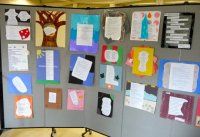Getting to Know Your Students Through Poetry
I knew I wanted to get to know my students. I wanted to hear about their lives, look through their eyes, experience the sounds of their world, and survey their emotional landscapes. I also knew I needed to do this in order to be a more effective teacher: I could tailor instruction to draw on what they already knew and bridge curriculum.
I knew I needed to know who they were so that I could expand my empathy. Middle schoolers can be a trying bunch; I'd need to open my heart wide so that when they tried my patience I'd have a reserve of compassion.
And so I asked them, "Where are you from?"
I am from laughter and jokes
when my whole family is together
and my aunts, grandma, and my mom are cooking food
and from the smells of tamales, enchiladas, posole, tacos
and many other Mexican foods.--A
I am from a family that ate only beans and tortillas everyday;
and from kids who would see the ice cream man pass
but didn't have enough money to buy one
I am from a family who crossed the border to come here
hiding from the cameras in the trees that wanted to catch them and from a family that had to sleep under a pile of rocks. --C
I am from a neighborhood where
police beat and choke
young people
I'm from a mother who does drugs
I'm from a father I never knew. --M
Preparing the Assignment
For this assignment, I used a plan from the Rethinking Schools publication, Reading, Writing and Rising Up: Teaching about Social Justice and the Power of the Written Word (an essential for any educator).
There's the outline of a lesson and some examples. I scaffolded and expanded it. I added a guided imagery exercise asking students to visualize walking home, walking into their home, noticing the smells, sounds, activities, feelings. I led them through the writing process -- brainstorming, drafting, lots of revision, peer revision, a conference with me, and so on. The process took some three weeks and culminated with a public reading and a "published" compilation of their poems.
I am from my mom and dad arguing till the crack of dawn
I am from the police taking me and my sister away from our parents
I am from missing my parents day and night
thinking about them, hoping they are thinking about me too. --W
I am from the Vietnam War
And from one night in Richmond
When I went to my window
and saw a dead body on fire and a friend telling a cop something. --D
I did a version of this poetry unit for many years, usually as a way to begin the year. I quickly realized that not only was I learning about my class, but as students shared their poetry, their understanding and empathy for each other also expanded. This, I knew, was essential to developing a community of learners.
From the Heart
The excerpts in this post are selected from one class of seventh graders. Their lengthy poems were heart-wrenching; they'd come to me for their writing conference and I'd look up from reading their poem into the face of a child, wondering how he or she could hold so much.
I wish I could say that for this blog post I chose outliers, dramatic passages; but unfortunately, these represent the overarching experience of my students in Oakland -- year after year they wrote poems like these. In reading them now, I feel the weight resettling. I wonder where they are now: "D," "W," "M," and "T?"
I am from the day when a guy put a gun to my cousin's head and said to my uncle "give me the weed or I'll blow his head off!"
I am from Psalm 23:4
"Even though I walk through the shadows of the darkest valley fear no evil for you are with me"
I am from all the cruelty against people of color
I am from the rancid smell of chitterlings given to slaves from their masters.--T
The selections here were from a class of 50 students. I try to do the math: How many classes of seventh-graders are there in my district? I'm afraid of generalizing experience --surely the lives of all low-income kids of color in Oakland aren't such a tragedy? But year after year their poems spoke of fear, loss, pain, injustice, and life experiences far too hard for any child.
It's the beginning of another school year. How do you get to know who your students are? How do you learn about where they come from?
